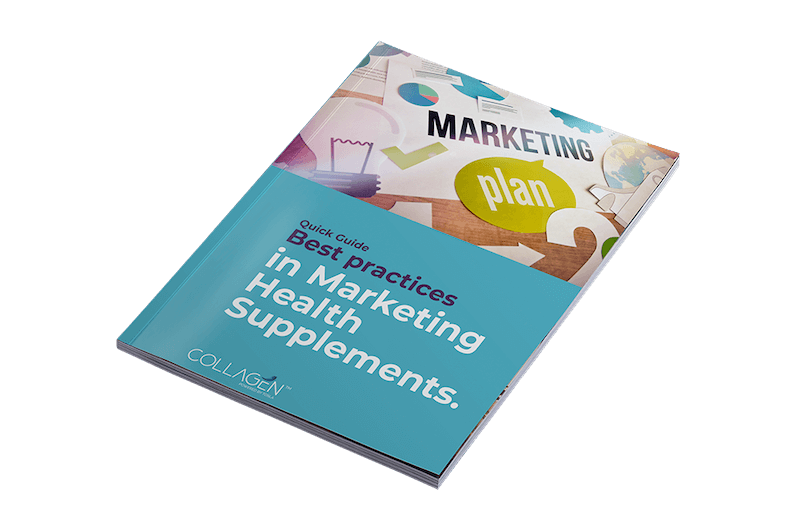Collagen-containing supplements are gaining popularity, and many consumers claim to have visible results on their skin, hair, and nails in as little as a couple of weeks. However, many people are still skeptical about the entire collagen supplement and its benefits. Many suppliers and producers decide to conduct clinical studies on their ingredients or formulation to prove their legitimacy.
We know a lot of branded ingredients with clinical studies, guaranteeing real results for consumers. Therefore, many brands that follow the trend of nutricosmetics and collagen would like to include these branded ingredients in their formulation. But is this way the best to test their product?
We spoke with Katja Žmitek, Vice Dean, Associate Professor at VIST, Faculty for applied sciences, who has led clinical studies with collagen formulations and tested their results on skin, hair, and nails.
There are no shortcuts to true excellence
She pointed out that studies are pricey, making it hard or even impossible for some businesses to invest in them. Many ingredients out there have clinical studies, which could be a shortcut for small businesses. But should companies take the ingredients that have clinical studies and apply those to their brand? In Katja’s opinion, it is essential to research the facts of an ingredient itself to know that it will work in a certain way. However, it is also vital to test the formulation. The formulation, namely, in which these active ingredients are included, can be influenced by the operability of the ingredients. Sometimes, up to several times just by changing the form and thermic process. Therefore, it is crucial to test the formulation and to see how ingredients interact with each other. Testing the formulation can also be stronger because of the synergistic effect of some ingredients on one another. This means that adding a particular ingredient can allow the other ingredient to absorb better or protect it in the system, or they can simply support each other. The end result could be better when certain ingredients are combined.
Furthermore, not every “clinical study” has the same credibility. Several factors must be considered when deciding to conduct a clinical study or deciding on the credibility of a study. It all starts with the credibility of an external institution conducting a study. “in-house” studies have a high risk of being too biased. External institutions must do the studies with a proper QC. These institutions must have good clinical practices and be aligned with the Helsinki declaration. It is essential to say that the most reliable clinical studies are “double-blinded.” That means neither the volunteers nor investigators know the product the volunteer receives. ,
Opinions can be biased but statistics are always true
The following important factor is whether it is placebo-controlled. There should always be a comparison without the active ingredients. Only in that way can we be sure that the observed effects are due to the active ingredients incorporated into the product.
There are a lot of “clinical studies” based on an expert opinion who saw some significant change in the skin. This kind of research does not have a high value. An expert could detect some changes, but there should always be a point of control with which the results could be compared. In practice, if there is an opinionable study, there should also be one group of subjects that receive a placebo product and another group of subjects that receive an active product. In the case of the results, these being the opinions, being much higher on the active product than the placebo product, we can claim the probability of the effect of the active product. However, it is crucial to have a proper statistical analysis of the given results. It is highly recommended to use a more objective measurement of the effect (more objective than opinion) if one is available.
It is critical how to collect the data and when to collect it, says Katja. If the study is done on the skin, the seasonal differences in nature play a significant role in the results. For example, skin hydration gets worse when we are approaching winter, and it gets better as we go into the summer. If we start the clinical study in the winter and you are doing it while approaching the summer, the skin will get better by itself. For that reason, it is crucial to have a placebo to be able to observe the effect of the active product. Otherwise, we can’t say that the product works because our skin has a natural cycle. Unfortunately, sometimes we can still see such studies without a placebo control and proper statistical analysis.
This might be very obvious for some, but for an ordinary consumer, it is difficult to understand and differentiate good results and good studies from unreliable ones.
To conclude: branded ingredients with clinical studies might be a shortcut for some businesses. However, they are not accurate indicators of quality products. Because of potential interactions between some ingredients, it is much more useful to test the formulation and not individual ingredients. To ensure the best results and provide the best formulations to our customers, Tosla recently conducted three clinical studies with three different formulations.
Contact us if you are interested in knowing more!









